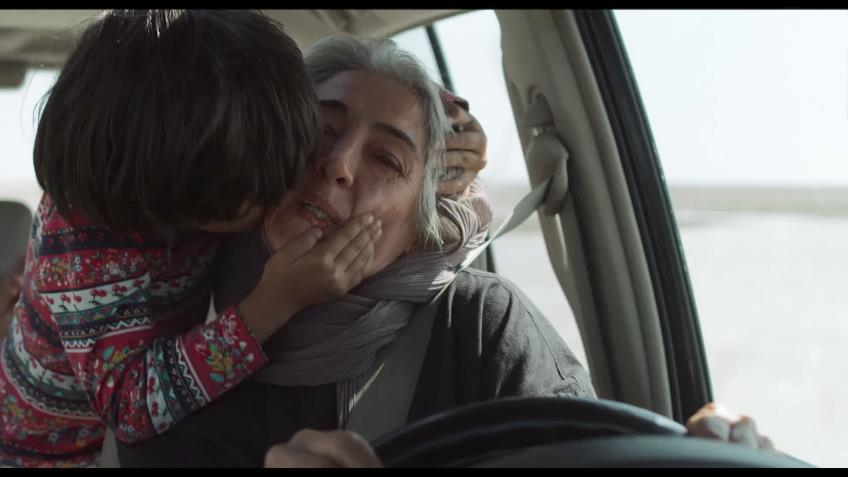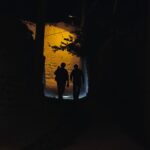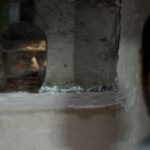Joyce Glasser reviews Hit the Road (July 29, 2022) Cert 12A, 94 mins.
Jafar Panahi’s 2011 film This is not a Film was made while the Iranian director was appealing his, his wife’s and daughter’s sentence of six years in jail (and a complete ban from all aspects of filmmaking and most travel) for creating propaganda against the government. The film was smuggled from Iran to the Cannes Film Festival on a flash drive hidden inside a birthday cake and was shown to critical acclaim. His most recent film (2015), Taxi, was made in secret in the streets of Tehran where Jafar is still banned from making films. So it is no surprise that Jafar’s son Panah Panahi, chooses a politically themed, family road movie for his feature debut, Hit the Road. What is more surprising is that Panahi’s impeccably acted film is so full of wit, warmth charm and real humour to belie its plot and subject matter.
On the hard shoulder of a main road in an arid landscape of oddly shaped hills, a burly, fiftyish man with an unkempt salt and pepper beard named Khosro (Hasan Majuni) sleeps in the back seat with a cast on his leg. His wife (Pantea Panahiha) sleeps in the front seat. Their son of around seven or eight (Rayan Sarlak) plays the piano tune we are hearing on a keyboard drawn on his dad’s cast. Their older son Farid (Amin Simiar), the driver, stretches his legs outside the car and waves to what we discover is the ailing family dog – a stray that Khosro had taken in and now wants to offload.
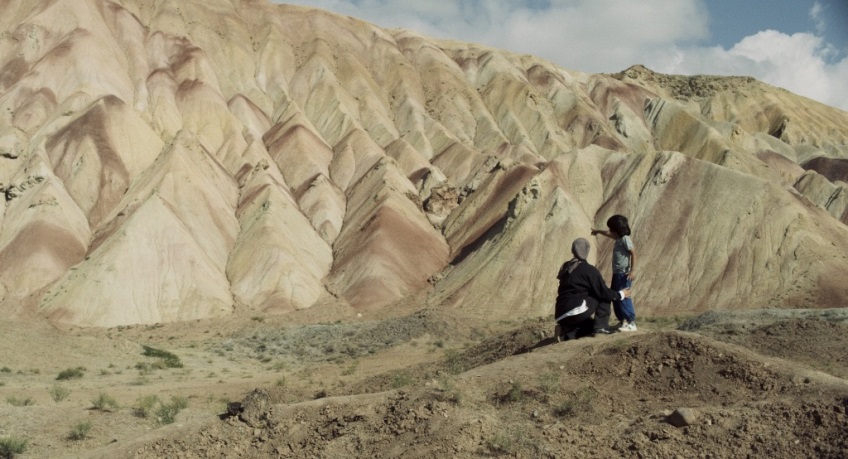
This, as we learn, is no ordinary family outing. They are driving from Tehran to the Turkish border, but to say more would be a spoiler. And Panahi wants us to focus on the journey, not the destination, just as the family are struggling to do. Their faces, interaction, conversations and unspoken thoughts run the gamut of emotions as they try to enjoy their last hours together and to hide two truths – Farid’s fate and the dog’s illness – from the little boy.
Along the way the wife (who has no name in the credits) believes they are being followed, but she is overanxious. When they discover the little boy had hidden his phone in his trousers, it is confiscated, and the mother buries it under a rock to retrieve on their return to Tehran. He can’t be trusted with a phone. When the boy protests, his father says, ‘take it easy; it’s the sim card not your willy.’
There are plenty of one-liners that contribute to maintaining the balance the family itself are feeling between trying to maintain a façade of levity, and the dread that they feel.
But his youngest son claims if he does not answer the phone people will worry. ‘Who worries about you, little fart, more than your father?’ Khosro asks. In a hilarious dialogue the little boy tries to convince his father that his love interest, an older woman named Ms Fakhari, ‘is the worrying kind’ and will break up with him if he doesn’t answer her calls. This is a seven-year-old with a dramatic imagination – who might one day grow up to make films.
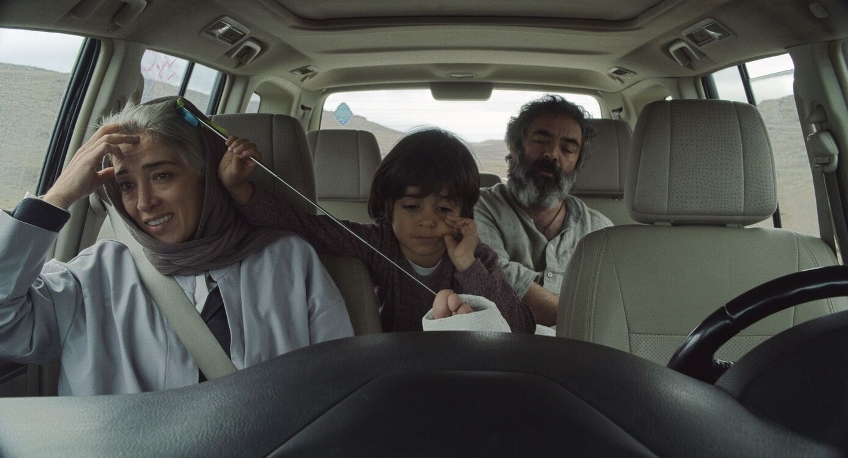
Waving his arms out of the window the boy accidently knocks a racing cyclist off his bike, and they take him into the car to examine his injured leg. Another humorous, but more philosophical conversation occurs when they offer the cyclist a ride to the infirmary. His hero is Lance Armstrong who the father dismisses as a dishonest cheat. ‘Haven’t you done anything illegal’, the cyclist asks, not realising he might be hitting a very raw nerve – although so much that we take for granted is illegal in Iran.
They quickly begin to discuss the boundaries people create. During the conversation, the bored little boy keeps offering the cyclist food, until his father says, ‘stop feeding him, he isn’t a zoo’, another funny line to suggest this family’s sense of humour, even in stressful, serious times. When the cyclist departs, he notices the dog and Khosro offers it to him. ‘Even if I did, what will you tell the kid?’ the cyclist asks. ‘That you kidnapped him,’ Khosro jokes.
At another stop Khosro stands aside to talk to the fixer helping Farid leave the country, and we hear Khosro confirming he will sign over his mortgage deeds for the bail. As they approach their destination Khosro and Farid have a father-son conversation in which Khosro gently advises Farid, ‘a man shouldn’t cry in front of his mother.’ When Farid asks if a man could cry in front of his father, Khosro smiles, ‘I’ll give you permission.’
When his wife, annoyed at Khosro, raises doubts about Khosro’s broken leg, given how long the cast has been on, the cast becomes a symbolic handicap like a bird with a broken wing. How helpless a father must feel in the circumstances, although we still do not know exactly why Farid has chosen to or must flee the country.
The wife tries to liven up the journey with karaoke to the radio and the little boy begins dancing while his father and mother move their arms to the rhythm. Farid, now so full of guilt about his family’s sacrifice, and so nervous about his future, finally snaps. The family will tell the little boy Farid is getting married although they can’t explain why the family cannot attend the wedding.
In this bittersweet family drama Panahi’s only false move is one karaoke song too many in which the little boy’s cuteness is milked for all it’s worth. This is overkill in an otherwise stellar debut.

